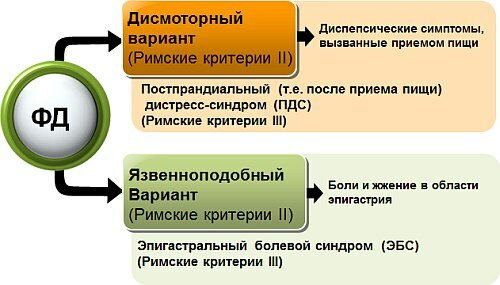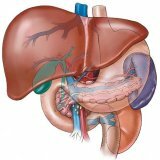Dyspepsia of the stomach: symptoms, causes, methods of diagnosis and treatment
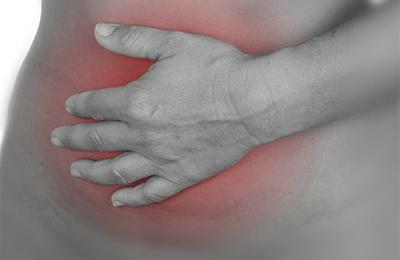 Dyspepsia of the stomach - so in medicine is called the aggregate of syndromes that appear in the disturbance of the digestive system.Most often, dyspepsia means a violation of the process of digestion of food in the stomach and a slowdown in the emptying of the hollow organ.This disease can occur not only against the background of pathological processes in the stomach, but also in other diseases that are not associated with the digestive system.
Dyspepsia of the stomach - so in medicine is called the aggregate of syndromes that appear in the disturbance of the digestive system.Most often, dyspepsia means a violation of the process of digestion of food in the stomach and a slowdown in the emptying of the hollow organ.This disease can occur not only against the background of pathological processes in the stomach, but also in other diseases that are not associated with the digestive system.
Classification of dyspepsia stomach
In medicine have identified two main forms of gastric dyspepsia:
- functional.With this form of the disease there are no organic lesions of the digestive system, there are only functional disorders.
- Organic.Dyspepsia in this case will be associated with structural changes in the cells / tissues of the digestive organs.It is with organic dyspepsia that the symptoms of the disease are clearly pronounced.
classified the disease in question and for the reasons that triggered its development:
- Alimentary Dyspepsia - there is a direct relationship pathology symptom appearance with eating disorders.She, in turn, subdivided into:
- fermentation - the patient consumes large amounts of foods high in carbohydrates( beans, bread, sweet pastries, cabbage) and drinks prepared by fermentation( kvass, beer).
- Putrefactive - is more often diagnosed when consuming a large number of protein products, as well as not fresh meat.
- Soap - occurs on the background of a large amount of fat in the diet.Especially often soapy( it is also called fatty), alimentary dyspepsia is inherent in people who eat pork and lamb.
- Dyspepsia due to inadequate release of food enzymes.This makes it difficult to digest food in the stomach.This type of the disease in question is divided into:
- enterogenous dyspepsia - the patient is released too small amount of gastric juice;
- gastrogenic - insufficient quantity of gastric enzymes;
- is hepatogenic - there are abnormalities in the process of producing bile by the liver;
- pancreatogenic - a small amount of secreted enzymes by the pancreas.
- Dyspepsia, directly related to disturbance of the intestinal absorption process.Most often occurs against the background of malabsorption syndrome - it is a congenital disease that is characterized by a violation of the absorption of nutrients into the blood.
- Dyspepsia in the background of intestinal infections.In this case, the disease in question will be classified as secondary.May occur in the background:
- dysentery( shigellosis infection) - a pathology that affects the large intestine.The most characteristic symptom of the disease is feces with impurities of blood and mucus;
- Salmonellosis( acute intestinal infection of bacterial etiology) is a pathology that is diagnosed with vomiting, diarrhea, hyperthermia, dizziness.
- Intoxication dyspepsia.It develops against the background of poisoning during the development of various pathologies - for example, with purulent infections, influenza, poisoning with poisonous substances.
Causes of dyspepsia
Gastric dyspepsia may occur as an independent disease, but may also be a concomitant syndrome. From the main causes of dyspepsia primary isolated:
- Elevated excretion of hydrochloric acid in the stomach with gastritis.
- Disturbance of motility in the duodenum, large intestine and stomach.
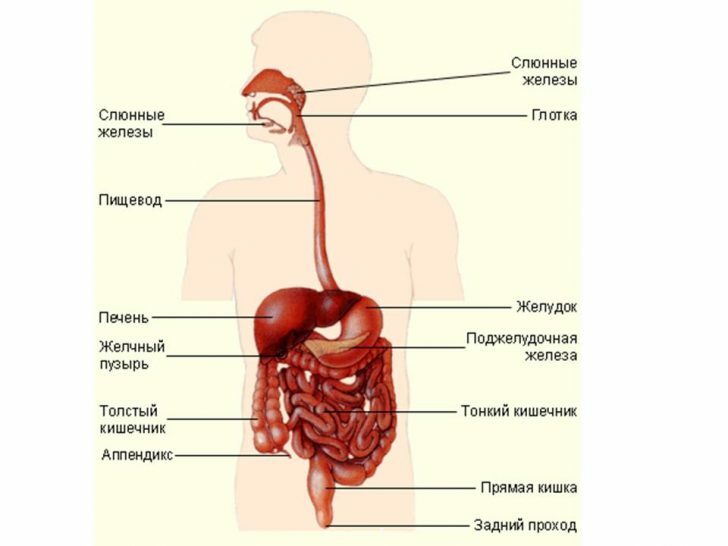
- Disturbance of the diet - in particular, the predominance in the daily menu of products with a specific nutrient( for example, protein / carbohydrate or fatty foods).
- Poisoning with prolonged exposure to the body of chemicals, with the development of acute purulent diseases.
- Violation of the psycho-emotional background - stress, neurosis, depression.
- Prolonged intake of certain medications( eg, antibacterial, hormonal).
But there are also diseases that are accompanied by a syndrome of dyspeptic disorder:
- Allergy, individual intolerance to specific foods.
- Inflammation of the stomach( gastritis) with increased and decreased acidity of gastric juice.
- Gastroesophageal reflux disease.With it, there is a casting of gastric contents, which has a high content of hydrochloric acid - this leads to irritation and even burns of the esophagus.
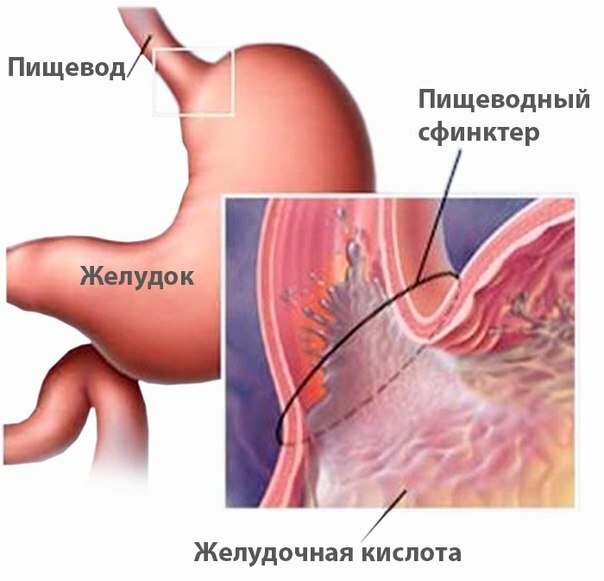
- Cholecystitis( inflammation of the gallbladder).
- Duodenogastric reflux.This pathology differs by casting the contents of the duodenum( undigested food, bile acids, enzymes) into the stomach - this causes irritation of the mucous membranes of the hollow organ.
- Diaphragmatic hernia.
- Gallstone disease.
- Stenosis of the pylorus of the stomach is the narrowing of the zone of the stomach at the site of the transition of the hollow organ into the duodenum.
- Peptic ulcer of the stomach and / or duodenum.
- Condition after removal of the gallbladder - postcholecystectomy syndrome.
- Intestinal obstruction.
- Tumors benign in nature, localized in various organs of the gastrointestinal tract.
- Malignant tumor of the stomach( cancer).
- Pancreatitis is an inflammation of the pancreas.
- Diabetes mellitus.
- Viral hepatitis A is an acute infectious disease of the liver.
- Achlorhydria is a decrease in the acidity of gastric juice.
- The syndrome of Zollinger-Elisson.
Symptoms of stomach dyspepsia
This disease is characterized by pronounced symptoms - the doctor at the primary admission of the patient can almost certainly diagnose on the basis of the complaints presented. Symptoms of dyspepsia include:
- pain syndrome in the upper abdomen - occurs periodically, differs a short course and is not associated with eating;
- feeling of nausea - can appear on an empty stomach, and immediately after eating;
- feeling of heaviness in the stomach - more often this sensation is localized in the upper abdomen;
- intrusive heartburn, which is accompanied by prolonged burning in the chest area;
- signs indicating the development of peptic ulcer of the stomach / duodenum - they are false, but too clearly simulate this pathology;
- sensation of bloating, raspiraniya stomach;
- feeling of fullness of the stomach even when eating a small amount of food;
- burp.
Note: in some sources is a sign of stomach dyspepsia called vomiting.But according to statistics, this syndrome is rarely present in patients, but it is after vomiting that a short-term relief comes. In general, all of the above symptoms are combined in their own way - there are certain combinations for different types of gastric dyspepsia .In particular:
- ulcerative course - there are eructations, pains "hungry" or nocturnal, heartburn;
- is a dysmotor - a feeling of fullness of the stomach, pressure and raspiranie in the abdomen;
- nonspecific course - all symptoms are present simultaneously.
Diagnostic measures
Despite the fact that the disease in question has pronounced symptoms, it is only on the basis of their presence that no doctor is diagnosed.In any case, it will be necessary to conduct a number of diagnostic activities of .These include:
- Collection of anamnesis of the patient's life - are there any previously diagnosed inflammatory / infectious diseases of the gastrointestinal tract.

- Collecting an anamnesis of the disease - the patient in the patient finds out when symptoms of pathology begin to appear, how intense they are, at what time of day they are intensified and how they are related to eating.
- Laboratory testing of the patient's biological material:
- blood and biochemical blood tests - this allows to reveal the violation of the functions of the digestive system and signs of inflammation in them;
- stool analysis for detecting the presence of blood - if hidden blood is found in the stool, this will indicate a stomach ulcer / duodenal ulcer, but deny stomach dyspepsia;
- general analysis of feces( coprogram) - laboratory assistants identify remnants of undigested food, dietary fiber, increased amount of fat.
- Instrumental study of the patient:
- esophagogastroduodenoscopy - a specialist with the help of equipment examines the condition of the mucous membranes of the stomach, esophagus and duodenum.It is mandatory during this study to take a small fragment of material from the surfaces to be examined for biopsy;
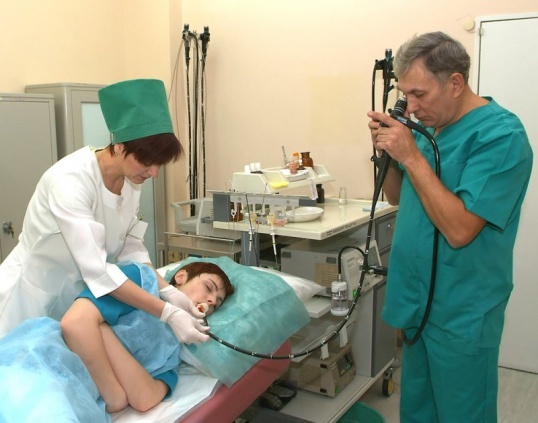
- Ultrasound examination of the organs of the gastrointestinal tract - this allows to detect the presence of a tumor in the pancreas, on the walls of the duodenum and stomach;
- Impedance-rn-metry - the doctor sets the level of acidity of the esophagus environment;
- gastric acid secretion test;
- study of biological material from the gastric mucosa to detect or deny the presence of Helicobacter pylori - a bacterium that has a damaging effect;
- Colonoscopy - examination using a special medical instrument( endoscope) of the inner walls of the large intestine;
- manometry( esophageal and anthroduodenal) - the physician sets the level of the motor activity of the esophagus, stomach / duodenum;
- computed tomography - allows to reveal hidden damage to the esophagus and stomach, hard to reach tumors;
- electrogastroenterography - a doctor can determine if there is a violation of intestinal motility.
Please note: does not prescribe a radiographic examination when conducting diagnostic activities for suspected gastric dyspepsia.It is advisable only if the esophagus narrows or the tumor forms in it.
Methods for treatment of stomach dyspepsia
The disease can be treated in several ways - all of them are approved by official medicine.The only clarification - when using recipes from the category of "traditional medicine" you need to get advice from your doctor.
Non-pharmacological treatment of dyspepsia
The following measures can be taken with the appearance of the first signs of stomach dyspepsia:
- after a walk at a moderate pace for at least 30 minutes after a meal - this helps to activate the motility of the intestines and stomach;
- strap on trousers and skirts tighten strongly;
- restrict exercise to the abdominal muscles;
- sleep only on a high cushion - this will prevent the release of stomach contents into the esophagus;
- adjust the food - refuse products that can cause an attack of heartburn( citrus, tomatoes and others), diversify the menu, eliminate overeating.
If gastric dyspepsia has been identified in the early stages of development, the above measures may well have an effect.
Medical treatment
First, doctors prescribe antidiarrheal drugs and laxatives.But patients need to know that you can not get involved with such drugs - for example, laxatives can be consumed only until the first emptying of the intestine. Secondly, when diagnosing gastric dyspepsia, the following are prescribed:
-
 painkillers - these are usually antispasmodic drugs that quickly and permanently relieve abdominal pain;
painkillers - these are usually antispasmodic drugs that quickly and permanently relieve abdominal pain; - hydrogen pump blockers are specific drugs that can reduce the acidity of gastric juice;
- enzyme means - they contribute to improving the process of digestion of food in the stomach and its cleavage into micro / macro substances;
- H2-histamin blockers - these drugs also reduce gastric acidity, but are less effective than hydrogen pump blockers.
Thirdly, if indigestion of the stomach develops on the background of stress or depression, then it will be necessary to conduct specialized treatment of these disorders of the psycho-emotional background.Drug treatment of the disease in question implies the holding of therapeutic measures for a specific pathology, which provokes the appearance of symptoms of dyspepsia. For example:
- Helicobacter pylori infection;
- peptic ulcer of the duodenum and stomach;
- cholecystitis;
- pancreatic diseases - diabetes( the patient's condition only stabilize), pancreatitis;
- duodenitis;
- gastroesophageal reflux disease and others.
Folk remedies for dyspepsia
In folk medicine, there are many recipes that are used for stomach dyspepsia. But before starting such treatment it is necessary to pay a visit to the doctor:
-
 , he will clarify the diagnosis - in some cases, the symptoms of the disease in question may indicate the development of a more complex and even life-threatening pathology;
, he will clarify the diagnosis - in some cases, the symptoms of the disease in question may indicate the development of a more complex and even life-threatening pathology; - will give recommendations on the feasibility of folk treatment;
- will conduct allergotests - this will avoid the occurrence of allergies to plant components of medicinal folk remedies.
The most effective recipes:
- Cumin / marjoram.Prepare a healing drink: in 200 ml of boiling water lower the crushed seeds of caraway and marjoram, insist 15 minutes.This drug should be consumed twice a day in a dose of 100 ml at a time.
- Fennel.To prepare the medicine you need to take fennel berries in an amount of 10 g, pour 200 ml of boiling water and heat until boiling( on a slow fire for about 15 minutes).Then cool the broth, strain and add boiled water to it so that the result is the original volume.The entire amount of the drug should be drunk during the day in small portions.
- Dill.The seeds of this spicy plant should be poured with boiling water and insist for 20 minutes.Proportion: 1 teaspoon fennel seeds per 200 ml of water.Take should be 30 ml immediately after meals.
Broths from herbal preparations help to cope with the dyspeptic phenomena perfectly. You can safely use the following recipes:
- Prepare aloe 375 g, honey 625 g and red wine 675 ml.Aloe leaves are washed and finely chopped, mixed with the rest of the ingredients.Take a drug should be 1 teaspoon before eating - this is the dosage for the first 5 receptions.In the future it is recommended to take 2 teaspoons twice a day before meals.The duration of treatment with this medicine is at least 2 weeks, the maximum period of use is 2 months.
- The roots of elecampane grind.Take 1 teaspoon of raw material and pour 200 ml of cold boiled water.Do not heat or boil!The drug is infused for 8 hours, then filtered and taken 1/3 cup three times a day before meals.Duration of admission is 2 weeks.
- In equal quantities, prepare yarrow, mint, chamomile, sage.Then take half a teaspoon of the finished dry mixture and pour 200 ml of steep boiling water, insist for 10-15 minutes.Take infusion of half a glass 3 times daily before meals.This drug quickly and effectively relieves pain.
- Bark buckthorn, fruit of anise, mustard seeds, licorice root, yarrow herb - mix these medicinal plants in equal proportions.Then take a tablespoon of the collection and pour 300 ml of boiling water, insist for 30 minutes.Take infusion should be half a cup in the morning and evening.
Please note: can not independently decide on the treatment of gastric dyspepsia by folk methods.Only after consulting with a doctor can you be sure of the safety of eating decoctions / infusions of your own preparation.
Possible complications
According to statistics, complications of stomach dyspepsia develop only on the background of the progression of the underlying disease. There may be:
- decreased appetite, until complete absence;
- sharp weight loss;
- rupture of the mucosa of the esophagus at the site of its passage into the stomach.
Preventative measures
 To avoid the development of indigestion of the stomach, you must adhere to the rules of prevention.They are fairly simple and do not require any special conditions for implementation. Doctors recommend:
To avoid the development of indigestion of the stomach, you must adhere to the rules of prevention.They are fairly simple and do not require any special conditions for implementation. Doctors recommend:
- perform a correction of nutrition - the menu should be diverse, with a predisposition for heartburn should be excluded in the use of citrus fruits;
- products should always be fresh;
- physical exertion is necessary, but they must be moderate;
- to limit the use of alcoholic beverages;
- to carry out usual hygienic procedures - to wash hands before meal, carefully to clear vegetables and fruit from pollution.
If there is a predisposition to the development of diseases of the organs of the gastrointestinal tract, heartburn and eructation occur periodically, increased gas production, constipation or diarrhea is noted, then one must take more care of one's own health.It is necessary to undergo an examination once a year from a gastroenterologist - this will help to identify at the earliest stage dyspeptic disorders.Dyspepsia of the stomach is a disease, in principle, not dangerous to human health.But it can lead to violations in the work of any organ of the gastrointestinal tract, and the state of health during periods of intense manifestation of symptoms leaves much to be desired.Therefore, it is necessary to respond in a timely manner even to minor disturbances in the digestive system - this will help to quickly regain health.To get more information about the symptoms, the causes of development, the methods of diagnosis and treatment of dyspepsia, you can view this review:
Tsygankova Yana Aleksandrovna, medical reviewer, therapeutist of the highest qualification category.

